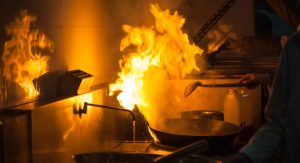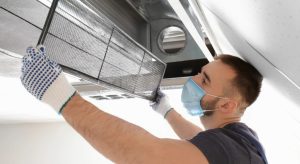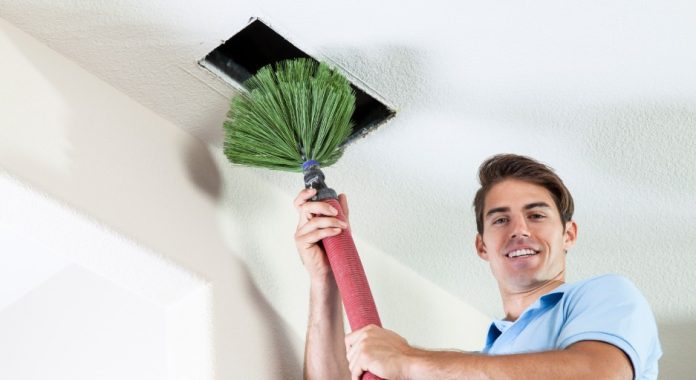Table of Contents
In February 2025, a fire broke out at a restaurant on Kilburn High Road. The London Fire Brigade responded quickly and later confirmed that the blaze started due to an overheated extractor fan and a buildup of grease within the ducting system.
The fire was worsened by poor ventilation hygiene, a problem that continues to put commercial kitchens at risk.
This incident serves as a clear warning to restaurant owners about the dangers of ignoring regular maintenance. Grease builds up rapidly in kitchen extraction systems and, when left uncleaned, becomes a serious fire hazard. The fire brigade stated that keeping ducts clean is essential to prevent similar incidents.
To meet fire safety standards and protect your business, extraction systems must be cleaned in accordance with Kitchen Grease TR19 Ventilation Cleaning guidelines.
These standards are designed to remove grease deposits before they can ignite, reducing the risk of fire and improving overall kitchen safety.
The Kilburn fire was preventable. It highlights why every commercial kitchen should take ductwork and extractor fan cleaning seriously before facing potentially severe consequences.
Understanding the Fire Risks in Commercial Kitchen Ventilation

Commercial kitchens are exposed to a high level of fire risk. Cooking activities produce heat, smoke, steam, and airborne grease, all of which are drawn into the extraction system. Over time, this creates a thick layer of grease within the ductwork, extractor fans, and hoods, turning these systems into a major fire hazard.
Without regular cleaning, these grease deposits can ignite. Fires often begin when high temperatures or sparks from cooking equipment make contact with contaminated ducting. Once a fire takes hold in the ventilation system, it can travel quickly through the building, bypassing fire-resistant barriers.
The London Fire Brigade continues to identify poorly maintained extraction systems as a common factor in restaurant fires. Many of these incidents could have been prevented through proactive upkeep and inspections.
This is where professional support becomes critical. Engaging certified commercial cleaning firms ensure that extraction systems are thoroughly cleaned and compliant with fire safety regulations.
Regular maintenance not only protects property and people but also demonstrates a responsible approach to risk management within the hospitality sector.
Legal Obligations and Fire Brigade Recommendations
Restaurant owners have a legal duty to maintain safe premises under the Regulatory Reform (Fire Safety) Order 2005. This includes proper upkeep of extraction systems such as ductwork, hoods, and fans to prevent grease buildup and reduce fire risk.
One key requirement is the implementation of regular ventilation inspections. These inspections help identify grease accumulation, faulty components, and compliance issues before they lead to hazards.
The London Fire Brigade supports routine inspection and maintenance as part of a responsible fire safety strategy in commercial kitchens.
Failure to conduct ventilation inspections or maintain cleaning schedules can result in legal consequences, including prosecution or loss of insurance coverage if a fire occurs. Fire safety officers often check extraction systems during site visits, and poorly maintained setups are viewed as a serious breach.
The London Fire Brigade also recommends that restaurants work with professionals who understand fire risks in kitchen ventilation systems. Cleaning frequency should reflect how often the kitchen is used, and full documentation of inspections and cleaning should be kept up to date.
Following these guidelines not only meets legal standards but significantly reduces the chance of fire, injury, and business disruption.
Consequences of Ignoring Ductwork Maintenance

Neglecting ductwork and extractor fan maintenance can have serious and costly consequences for commercial kitchens. One of the most immediate risks is fire. Grease and debris that build up inside ventilation systems are highly flammable, and if left unchecked, can ignite and spread rapidly throughout the premises.
The London Fire Brigade has repeatedly warned that many restaurant fires are linked to unclean ducting and poorly maintained extraction systems. Fires that start in these areas are often more difficult to control, and the damage can be extensive.
In some cases, the building may become unfit for use, forcing a business to close temporarily or even permanently.
There are also legal and financial implications. Insurance providers often require proof of regular maintenance, and failure to keep up with cleaning schedules can result in denied claims. Additionally, health and safety inspectors may issue fines or enforcement notices if a kitchen is found to be unsafe.
The Kilburn incident highlighted how quickly a preventable fire can escalate. The consequences are not limited to property damage but also affect staff safety, customer confidence, and the reputation of the business. Regular maintenance is not optional, it is essential for long-term operation and safety.
Implementing Effective Cleaning and Maintenance Practices
Preventing fires in commercial kitchens starts with consistent and thorough maintenance of extraction systems. This includes regular cleaning of ductwork, extractor fans, hoods, and filters. The frequency of cleaning should be based on how heavily the kitchen is used. For high-traffic restaurants, monthly or even weekly attention may be necessary.
The London Fire Brigade advises that all components of the kitchen ventilation system be cleaned regularly to prevent grease buildup.
They also recommend maintaining a clear schedule for inspections and cleaning, supported by records that can be provided during safety audits or insurance reviews.
Working with professionals who specialise in ductwork and extractor fan cleaning ensures the job is done to a recognised standard. For many kitchens, adhering to Kitchen Grease TR19 Ventilation Cleaning guidelines provides a solid benchmark. These standards help ensure that all areas of the ventilation system are cleaned to a safe level, reducing fire risks.
In addition to cleaning, routine checks should be carried out to look for signs of damage or reduced airflow. A proactive maintenance plan is not only a safety measure but also a legal and operational requirement for running a compliant, efficient, and protected commercial kitchen.


